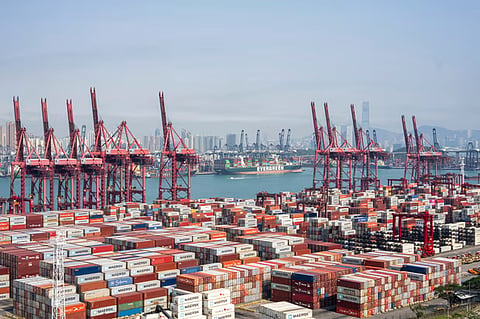

In an anticipated next step in the trade war, China has raised tariffs on US imports to 125%. This latest move in the escalating trade dispute with Washington came just hours after President Xi Jinping warned that “there are no winners in a tariff war”.
The announcement came from China’s commerce ministry on Friday, increasing previous duties of 84% and reiterating Beijing’s readiness to “fight to the end”. Officials signalled this may be the final tariff escalation, stating that US goods were no longer viable in the Chinese market at current rates.
“If the US continues to impose tariffs on Chinese goods, China will ignore it,” the ministry said, hinting at other potential countermeasures. In addition to tariffs, China has targeted 18 US companies and restricted Hollywood film imports.
Chaina's commerce ministry said it remained open to dialogue, but only on the basis of mutual respect.
Markets reacted nervously. Asian indices fell sharply, with Japan’s Nikkei down nearly 5% and Hong Kong stocks on course for their worst week since 2008. Oil prices were also set to decline for a second week.
Tensions rose after US President Trump excluded China from a 90-day global tariff pause, instead increasing duties on Chinese goods to 145%. In contrast, most other countries saw tariffs capped at 10% during the pause.
Xi used a meeting with Spain’s Prime Minister Pedro Sánchez to urge the EU to join China in resisting “unilateral bullying”. He emphasised the need to uphold international trade norms and avoid isolationism. Sánchez said Spain supported a more balanced EU-China relationship built on negotiation.
Meanwhile, French President Emmanuel Macron called Trump’s tariff pause “fragile” and warned of ongoing uncertainty for businesses worldwide. “Ninety days of pause means ninety days of doubt,” he posted on X.
Despite talks of potential deals, global financial markets remain volatile. The S&P 500 dropped 3.5% on Thursday, extending losses that have pushed it 15% below its February peak. US Treasury Secretary Scott Bessent attempted to calm investors, claiming over 75 countries were interested in trade talks.
Vietnam and Taiwan have begun preliminary discussions with Washington, with Vietnam promising to crack down on tariff evasion via its territory. Japan also plans to send a delegation to the US next week.
While Trump claimed he hoped for a deal with Xi, China reiterated it would not back down. “We will never sit idly by,” said foreign ministry spokesperson Lin Jian, accusing the US of undermining global trade rules.
The US pause does not apply to Canada and Mexico, whose goods remain subject to 25% tariffs unless they meet specific trade agreement terms. The EU, meanwhile, has opted to delay its first round of retaliatory tariffs—for now.